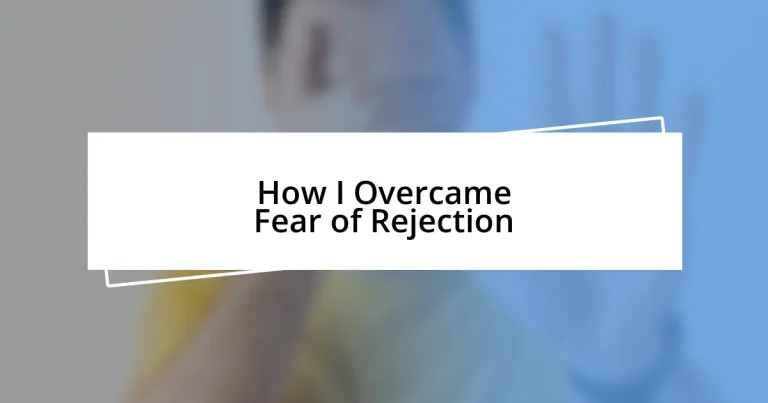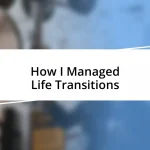Key takeaways:
- Understanding the fear of rejection reveals its deep connection to self-worth and can lead to resilience by acknowledging and processing these feelings.
- Identifying personal triggers, such as social gatherings and work presentations, empowers individuals to reframe their responses to anxiety-provoking situations.
- Practicing vulnerability in relationships fosters deeper connections and transforms rejection from a source of shame to an opportunity for growth and support.
- Celebrating small victories reinforces confidence and highlights the importance of participation over outcome in overcoming fear of rejection.
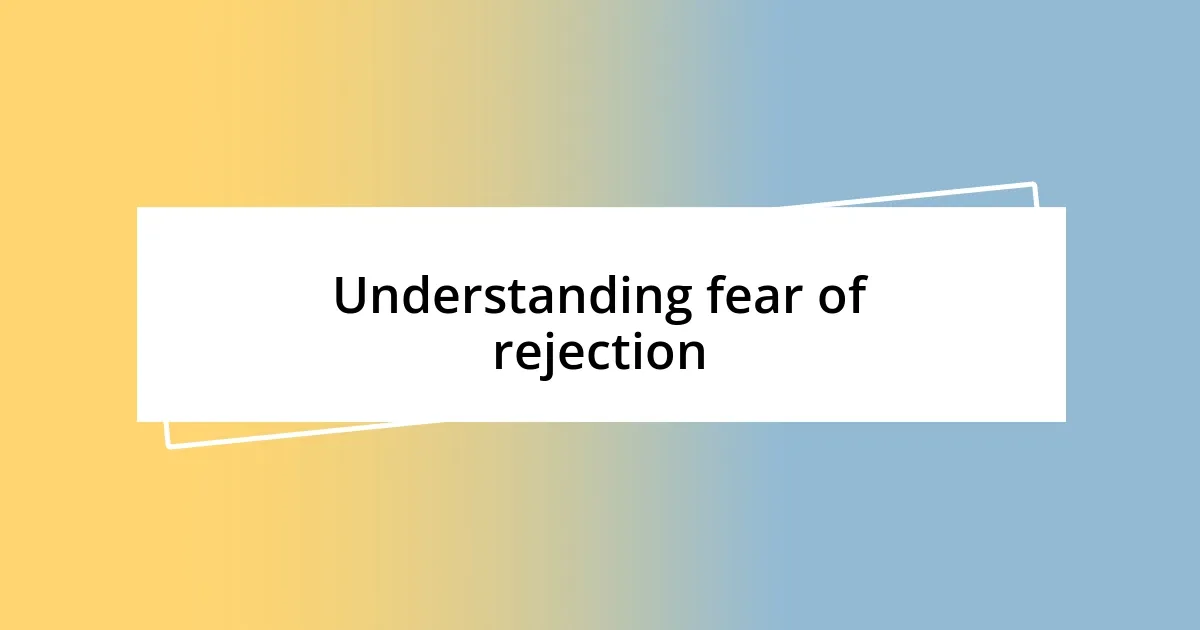
Understanding fear of rejection
When I first recognized my fear of rejection, it felt like a shadow looming over every interaction. I remember dreading social events where I could be judged or turned away, leading me to question, “What if they don’t like me?” This fear often stifled my ability to connect with others, highlighting how deeply embedded those feelings can be in our psyche.
Understanding the roots of this fear is crucial. It’s not just about the fear of a “no”; it’s often intertwined with self-worth and vulnerability. I learned that every time I faced rejection—and let’s be honest, I faced it a lot—it sent me spiraling into thoughts like, “Am I good enough?” that were more reflective of my insecurities than reality.
Sometimes, I noticed that I was more afraid of what rejection would say about me than the act itself. I’d replay scenarios in my head, imagining the worst outcomes. But over time, I discovered that understanding this fear can be liberating—acknowledging it allows me to take small steps toward resilience. Have you ever felt that gut-wrenching anticipation before sending a message or sharing an idea? That’s a common experience, and recognizing it can set the stage for meaningful change.
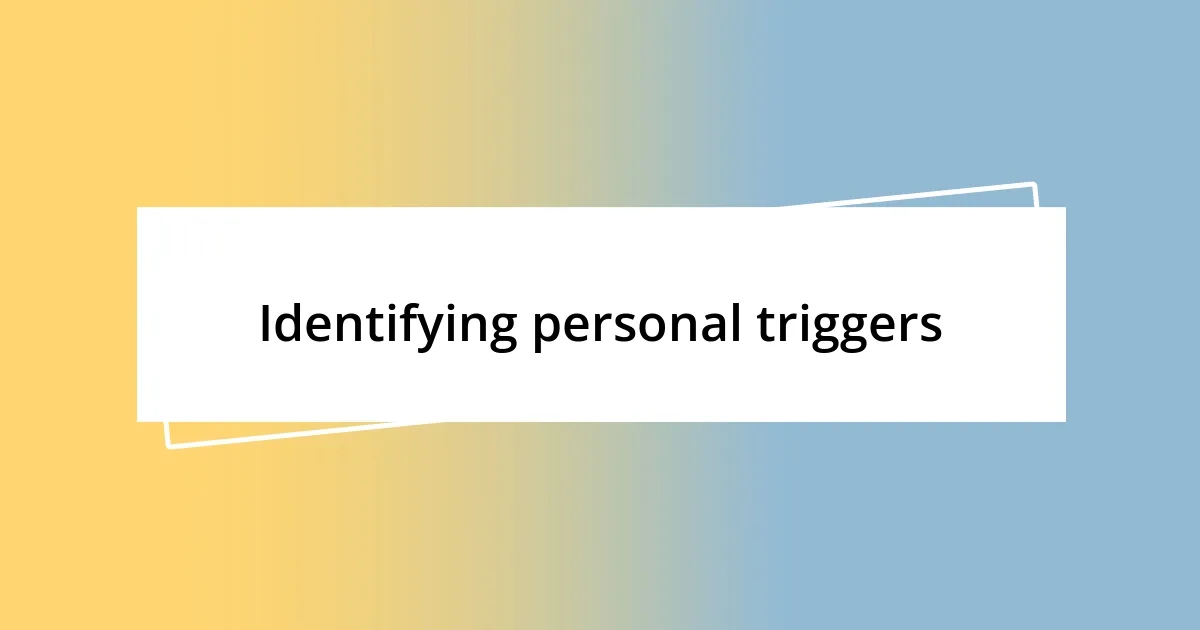
Identifying personal triggers
Identifying personal triggers can be a game-changer in addressing the fear of rejection. I found that certain situations consistently sparked my anxiety. For instance, I felt my heart race during meetings when it was my turn to share ideas—my palms sweaty, a tightness in my chest, and a swirling sense of impending doom. When I started noticing these physical reactions, I felt empowered to pinpoint what specifically triggered them.
Here are some common triggers I’ve identified:
- Social gatherings: The fear of being left out or judged in a crowd.
- Work presentations: Anxiety about being evaluated or ridiculed by colleagues.
- Vulnerability in relationships: The worry that sharing personal feelings might lead to rejection.
- Conflict situations: Fear of disagreement leading to rejection by peers or loved ones.
- New experiences: Hesitation in trying something unfamiliar out of fear of not meeting expectations.
Tracking these triggers allowed me to understand my emotional landscape better. Each time I acknowledged a trigger, I took a step toward reframing my thoughts and learning how to respond differently. It’s about creating a dialogue with myself, asking, “Why does this situation make me feel this way?” That exploration was key to my journey in overcoming my fear.
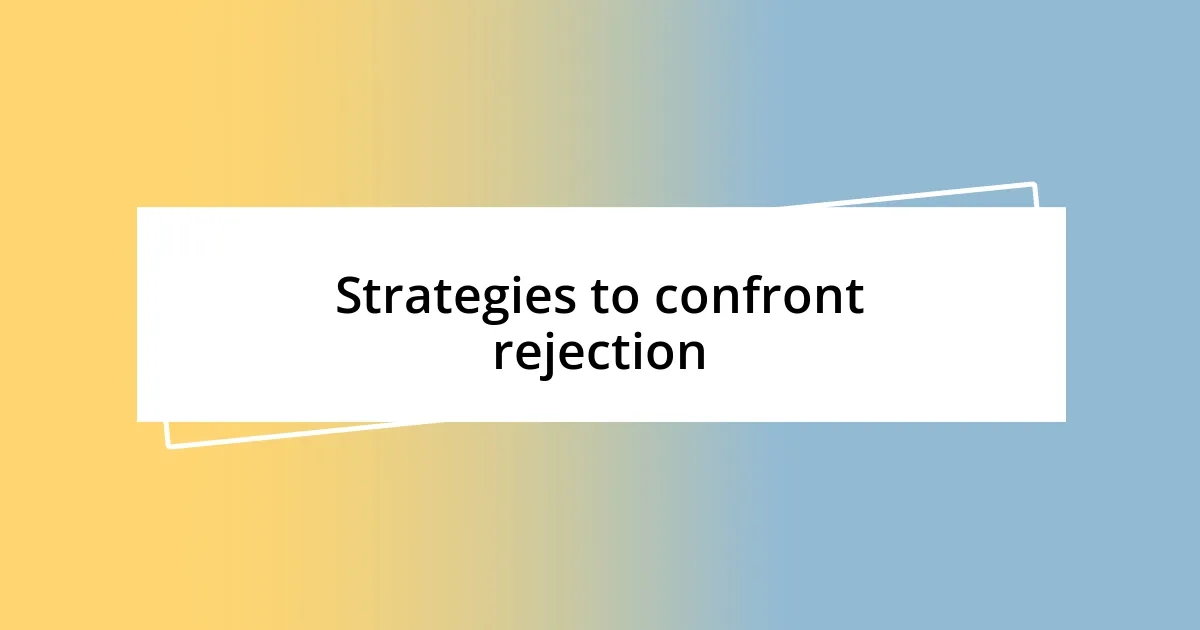
Strategies to confront rejection
I found that developing practical strategies can significantly help when confronting rejection. One of my go-to techniques has been a simple yet profound one: practice small acts of bravery. I still recall the first time I approached someone at a networking event, my heart racing. I set a low-stakes goal: just saying hi and initiating a conversation. Even though the outcome was uncertain, that small step was empowering. It built my confidence, showing me that rejection is just a part of life, not a reflection of my worth.
Another strategy that proved effective is reframing rejection as a learning opportunity. Each time I faced a “no,” I started asking myself, “What can I learn from this experience?” Instead of sulking, I played it back in my mind. For instance, after missing out on a role I really wanted, I analyzed the feedback I received. It turned out to be a goldmine for personal growth. I realized that taking rejection as constructive criticism allowed me to improve and grow, opening doors to better opportunities in the future.
I also embraced vulnerability by expressing my fears openly with trusted friends. Sharing my worries about rejection provided relief that I hadn’t anticipated. It was surprising to find that many of my friends had similar experiences. This communal understanding created a safe space for exploration and support, helping me acknowledge that rejection happens to everyone, and it’s okay not to be perfect. Building these connections transformed my perspective, allowing me to face rejection with renewed courage.
| Strategy | Description |
|---|---|
| Practice Small Acts of Bravery | Engage in low-pressure interactions to gradually build confidence. |
| Reframe Rejection | View rejection as a learning experience to improve and grow. |
| Share Vulnerabilities | Openly discuss fears with friends for support and shared understanding. |
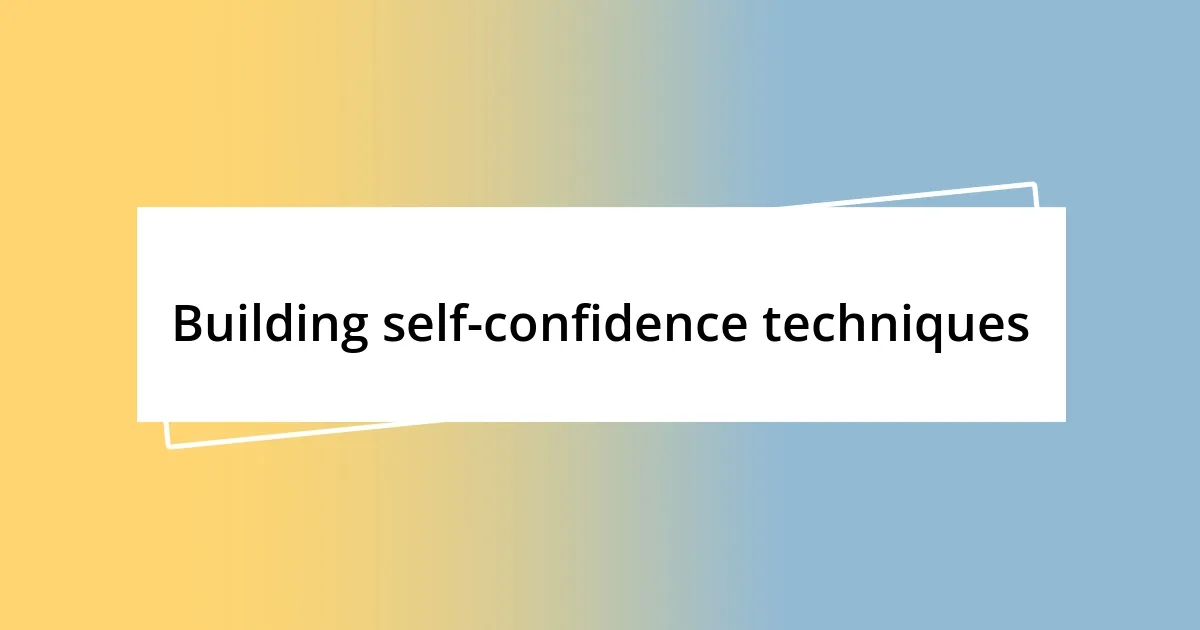
Building self-confidence techniques
One technique that resonated deeply with me was visualization. I remember vividly sitting in quiet moments, imagining myself handling rejection with grace—a job interview gone wrong or a proposal turned down. I’d envision myself smiling, acknowledging the situation, and moving on gracefully. This mental rehearsal made a surprising difference; it slowly conditioned my mind to see rejection not as a personal defeat, but as an encounter I could navigate successfully.
Another valuable practice has been setting achievable goals. For instance, during my first week at a new job, I decided to compliment a colleague on their work. It seemed simple, yet the thought of initiating a conversation was nerve-wracking. But stepping out of my comfort zone and achieving that small win reinforced a crucial lesson for me: every confidence-building interaction can serve as a stepping stone toward greater self-assurance. Wouldn’t it be amazing if we could view each small success as fuel for future risks?
Lastly, I learned the importance of self-compassion. I used to beat myself up for feeling scared or for dwelling on rejection too long. However, when I started treating myself with kindness, acknowledging that it’s perfectly normal to feel vulnerable, everything shifted. Now, when I experience a setback, I remind myself, “It’s okay to feel this way.” This gentler approach has allowed me to bounce back with much more resilience, turning setbacks into opportunities for growth rather than permanent roadblocks. How often do we forget that everyone experiences rejection? It’s just part of the journey, after all.
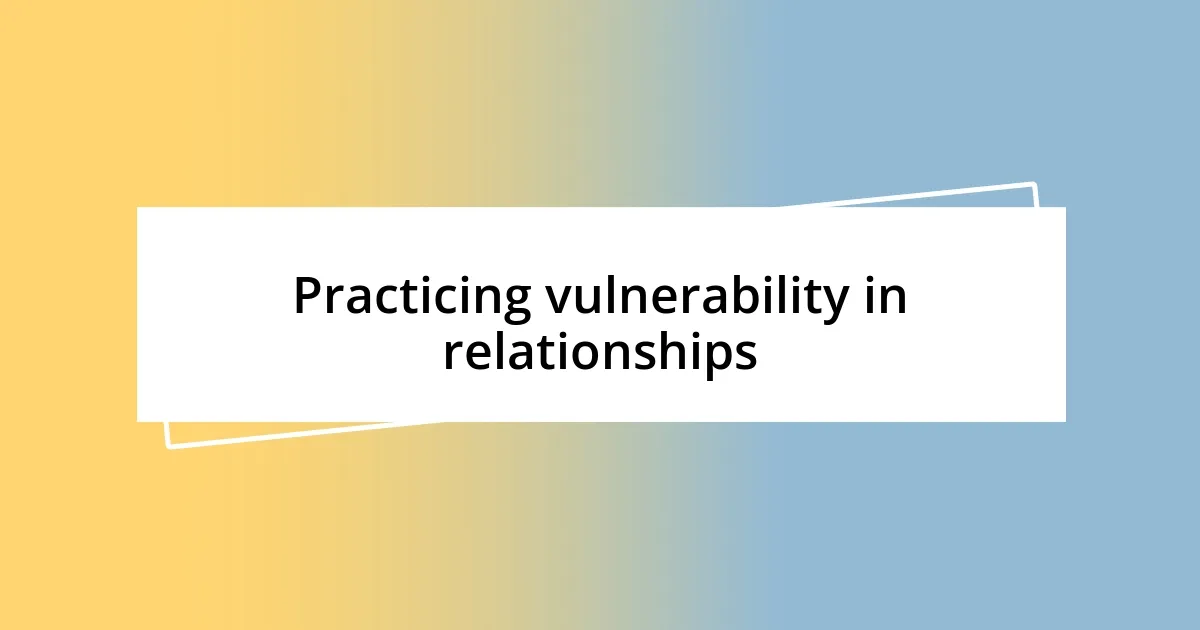
Practicing vulnerability in relationships
Practicing vulnerability in relationships has been a transformative experience for me. I remember the first time I opened up about my fears with a close friend; my palms were sweaty, and my heart raced. To my surprise, instead of judgment, I found compassion. We shared stories of our insecurities, which not only deepened our bond but also made vulnerability feel less intimidating. Have you ever realized that vulnerability can be a bridge rather than a wall?
When I began to embrace vulnerability, I noticed how it fostered deeper connections in my relationships. I tried sharing my anxieties and hopes openly, and watching how others responded was enlightening. Their willingness to reciprocate made me feel seen, creating an atmosphere of trust. This shift taught me that vulnerability isn’t a weakness; it’s a strength that invites authenticity into our interactions. Isn’t it fascinating how vulnerability paves the way for genuine connections?
The process hasn’t always been smooth; I’ve felt moments of hesitation. At a gathering, I hesitated to share a recent setback, fearing it would dull the mood. But as I finally spoke up, I realized my story resonated with others, creating a ripple effect of sharing. Those moments have taught me that our vulnerabilities often resonate deeply with others, dismantling the barriers we unconsciously build. Feeling connected in our imperfections is often what makes relationships truly enriching, wouldn’t you agree?
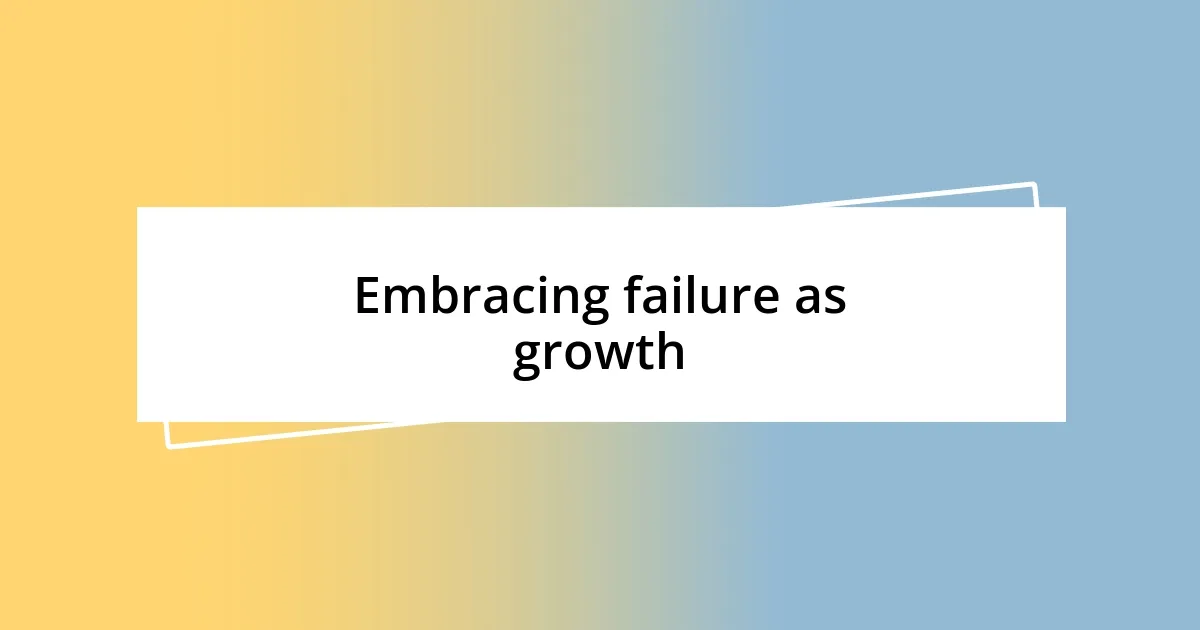
Embracing failure as growth
Embracing failure as growth has truly reshaped my perspective on rejection. There was a time when I dreaded failure so much that it paralyzed me. But then, during a particularly challenging project at work, I made a critical error. Instead of wallowing in shame, I decided to analyze what went wrong, and through that reflection, I unearthed valuable lessons that transformed my approach moving forward. Isn’t it remarkable how mistakes can illuminate pathways we hadn’t considered before?
I vividly recall a time in a group presentation where our team tanked spectacularly. While others were upset, I felt an odd sense of relief. It sparked a conversation that revealed each team member’s fears and expectations. This moment made me realize that failure isn’t just an end; it’s often the starting point for deeper dialogues and critical growth. Have you ever noticed how sharing vulnerabilities can unexpectedly bring a team closer?
Moreover, I now relish the idea of “failing forward.” I remember signing up for a public speaking event, terrified of messing up, yet I knew I had to face it. When I stumbled over my words, the audience responded with laughter, prompting a light-hearted moment. Instead of feeling embarrassed, I embraced it and turned it into a fun part of my talk. That experience reinforced the notion that failures can lead to unexpected connections and growth. How often do we forget that behind every mistake lies an opportunity for a more authentic experience?
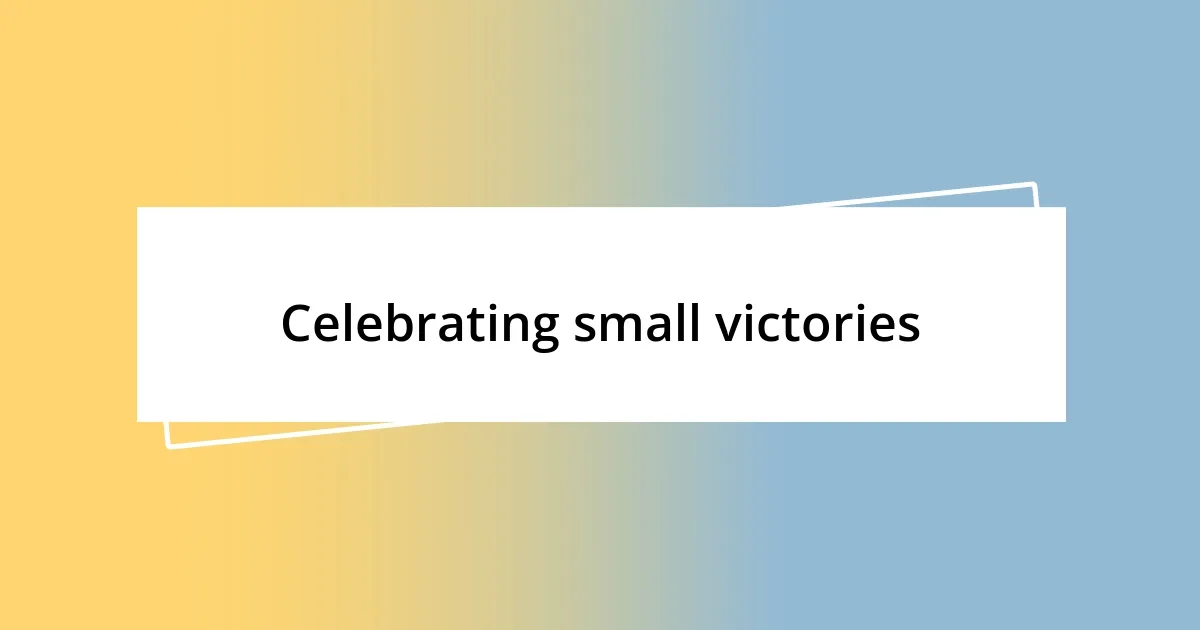
Celebrating small victories
Celebrating small victories has been pivotal for me in overcoming fear of rejection. For instance, I started small by simply sharing a new idea during meetings at work. The first time I did it, my heart pounded, and I braced myself for criticism. But instead, my colleagues responded with encouragement. That reaction sparked a joyful realization: every small win builds confidence, reinforcing the belief that I can contribute positively without fear.
I also made a habit of recognizing personal milestones, no matter how minor they seemed. There was one moment when I decided to compliment a stranger at the coffee shop. It felt terrifying at first—would they think I was strange? But when they smiled back in appreciation, I realized the power of those little interactions. Each instance of putting myself out there, no matter how trivial, became a stepping stone. How often do we overlook the importance of these small but significant moments?
As I began to acknowledge these little victories, I noticed a gradual shift in my mindset. Rather than focusing solely on the outcome of interactions, I learned to appreciate the act of participating itself. Why is it that we often wait for big achievements to feel accomplished? When I started celebrating small wins, I felt more resilient and liberated. It taught me that the journey is just as important as the destination—every step forward, no matter how small, deserves recognition.












